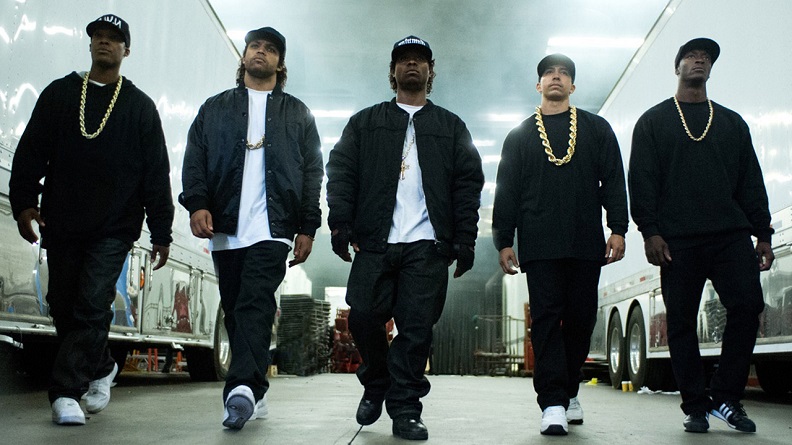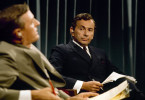Straight Outta Compton
Director: F. Gary Gray
(In theaters)
B+
With a clever and concise combination of adequate performers and careful authenticity, F. Gary Gray’s Straight Outta Compton is both a definitive urban drama and a tragic narrative of fortune’s toxins. Tracing the rise and fall of N.W.A. through the lens of the revolutionary ensemble’s primary members, the film makes for a solid biographical piece with very little down time. While definitely not the most balanced work, the film’s acknowledgment of its historical backdrop and a highly relevant look at modern racial tensions makes Compton worth championing.
Cube (O’Shea Jackson, Jr.), Andre (Corey Hawkins) and Eric (Jason Mitchell), three disgruntled youths, are desperate to find something beyond the trials of inner-city life. Cube, an avid writer, gradually finds a niche for his rebellious lyrics while Andre relentlessly refines his burgeoning mixing skills, much to the chagrin his mom and the mother of his young child. Eric, on the other hand, has a penchant for pushing coke but is ultimately coerced into performing by Cube and Andre for both his untapped charisma and fiery spirit. After assimilating Lorenzo (Aldis Hodge) and Antoine (Neil Brown, Jr.), the newly formed N.W.A. is quickly picked up by Jerry Heller (Paul Giamatti), propelling the group to unforeseen heights of fame and infamy. Yet Compton‘s staying power is in the group’s fallout, as they seek further grandeur (or lack thereof) within their solo tangents.
The film’s opening moments are reminiscent of a highly stylized variation of John Singleton’s Boyz n da Hood (discussed briefly in the movie), though it forgoes contemplation in favor of emotional outpours and thrills. This works both for and against the film; although the hard-hitting pace parallels the thunder of Compton’s subject, it makes it difficult to connect on a deeper level.
While many found several overt feminist messages in Mad Max: Fury Road, none even attempted to be powerful enough to have any lasting impact. This is not true for Compton, as waves of racial tension compounded by authoritarian abuses signal a clear message. It does deliver, mind you, but not without a few hiccups.
In one instance, Cube jots down a few rhymes on a school bus before casually peeking out an open window. At the bottom of his view, the students of a primarily white school frolic in a parking lot, and two girls in a convertible casually wave to perhaps the only non-threatening police officer on screen. It’s a subtle moment in an almost entirely nonstop narrative, illuminating the division between two physically close yet culturally distant worlds. Additionally, several scenes expertly illustrate the detriment of white privilege, seen once when Jerry is forced to deter law enforcement after attempting to arrest N. W. A. in front of their own recording studio, and again when a white journalist inquires about Cube’s supposed anti-Semitic track rather than the artist’s work in relation to racial inequality.
Unfortunately, other scenes purport a less noble cause. The film’s opening frames depict a woman being violently bashed against a wall by a motorized battering ram, compounded by another woman losing consciousness at the hands of Eric via an open fridge moments before. These moments, while periodic, are stacked heavily at Compton’s front end, forming an unnecessary hurdle to bound over for an otherwise strong offering.
Compton’s two most pivotal and visually striking episodes come in its middle and near-final acts. The group is sternly threatened against performing “Fuck tha Police” (by the police, no less) at a sold-out concert in Detroit — an expertly composed scene that crosses what feels like genuine concert footage with an intimate look at onstage frustration. In a later scene, Dre drives through the desolation brought on by the Rodney King trials. Strewn about are rioters, officers in riot gear and burning vehicles in a moment almost devoid of sound. The images are brilliant, jarring, and an appropriate companion to the continuing struggles of today’s racial injustices.
Of course, the soundtrack will appeal to fans of the N. W. A., as well as Ice Cube and Dr. Dre’s early independent work. Even for those not terribly swayed by rap’s first prodigal sons, it’s hard to deny the accuracy tapped into by its young performers. And the brief cameo appearances by Snoop Dogg (Keith Stanfield) and Tupac Shakur (Marcc Rose) pay an adequate homage to the artists’ distinct stylings and sound.
Straight Outta Compton is a biopic rarity, one that manages to be as riveting as it is relentless. It’s a terrible shame that Universal offered added security at the film’s opening weekend, a suggestion that paints the film with an utterly unnecessary stigma. Instead, everyone should just loosen up, open their eyes, and “witness the strength of street knowledge.”





